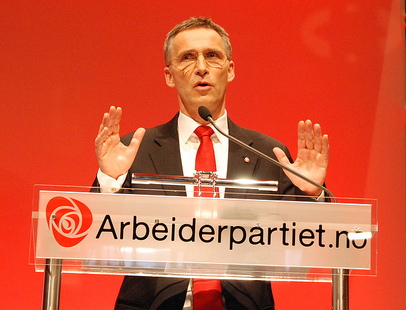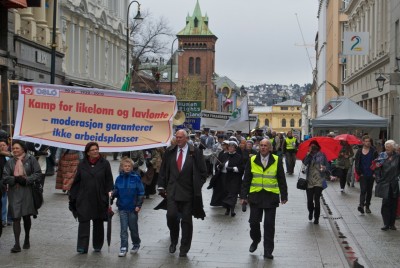NEWS ANALYSIS: With tens of thousands of state and municipal workers now out on strike in Norway, the country’s Labour-led government is suddenly at odds with the labour movement that otherwise supports it. Employers and conservatives, however, still think Norway’s Labour Party (Arbeiderpartiet) gives the country’s largest trade union confederation LO too much power.

A curious conflict has broken out in local media in recent days, in addition to the one that now involves picket lines and suspension of many public services. Kristin Clemet, a former government minister for the Conservative Party, complained to newspaper Aftenposten that Labour and therefore Norway’s Labour-led government has let its traditional ties to LO result in LO having a disproportionate amount of power within the labour movement.
Clemet, who now heads conservative think tank Civita, said that Civita interviewed 14 leaders of other large organizations that make up the so-called “three-part cooperation” among the state, labour unions and employers. The cooperation also plays heavily into the so-called “Nordic Model” that’s guided and generally boosted the economies of Nordic countries since World War II, with all three sharing responsibility for economic development. Clemet claims Labour Prime Minister Jens Stoltenberg may be threatening the Nordic Model he so often credits for the success of Norway’s economy and mostly well-functioning social welfare state.
She thinks Stoltenberg’s close relationship with LO and its leaders, who represent 53 percent of the labour market, comes at the expense of other labour unions and their confederations like YS and Unio. In short: LO sets the agenda for the labour movement and grabs the ear of the Labour-led government, frustrating other labour organizations. Some of them confirm the frustration. The head of Unio, for example, says it was “much easier” to have contact with Stoltenberg’s predecessor as prime minister, Kjell Magne Bondevik of the Christian Democrats who headed a center-right government, than it is with Stoltenberg.

Clemet’s remarks were published last week just before LO, YS and Unio all called a strike against Stoltenberg’s Labour-led government. Her views thus might seem to have been somewhat off-base, since the strike is a rather clear signal that not only did all three labour organizations agree to strike, but Stoltenberg and LO leader Roar Flåthen disagreed over the pay raises workers should get. So much for their allegedly close relationship or allegations that they regularly snakker sammen, a Norwegian expression often used to suggest talks behind someone else’s back.
But this week, several days after the strike began, the head of the national employers’ organization NHO (Næringslivets Hovedorganisasjon) John Bernander echoed much the same complaints as Clemet, and in doing so followed up on a commentary written by NHO’s president, Kristin Skogen Lund, last autumn. Important workplace issues, Bernander claimed, are drafted first between Stoltenberg’s Labour-led government and LO, with LO thus sets the premises for the debate. NHO’s proposals tend to get put away in a drawer, Bernander told Aftenposten, posing another threat to the Nordic Model where all sides are supposed to be heard.
NHO, as the representative for employers signing the paychecks, is generally viewed as carrying more weight than the state or the unions. “But I must admit that even though we sit at the top, I register that the government listens more to LO,” Bernander told Aftenposten. “We have also noticed that LO economically and otherwise has invested more than normal in this government.”
Other employers’ groups also think LO has the upper hand with Stoltenberg’s government, but Bernander’s complaints were countered by both LO boss Roar Flåthen and Stoltenberg’s Labour Minister Hanne Bjurstrøm. LO’s influence, Flåthen said, isn’t just a result of LO’s size but also that it has broad policies that “take responsibility for development” of Norwegian society. He claims its cooperation with other labour groups improves working conditions for all employees, organized or not.
Bjurstrøm said it should come as no surprise that there’s a close relationship between a left-center government and LO, but she claims her ministry listens to all parts on labour issues, including all the trade union confederations and the employers’ groups. She doesn’t think the Nordic Model is threatened.
“As Labour Minister in a left-center government, of course I talk a lot with LO, anything else would be surprising,” Bjurstrøm told Aftenposten. She said it would also be surprising if she were to go along with NHO’s call for more lenient rules for use of temporary employees, “a policy I don’t support and which doesn’t have support in the parliament.”
Moreover, Bjurstrøm claimed, “it’s absolutely not true that we always do what LO wants.” She pointed, for example, to the government’s support for an EU directive on temporary workers that LO opposed.
She could also point to the increasing numbers of striking workers nationwide. As the strike entered its seventh day on Wednesday, and workers in Oslo joined in, there were no reports of contact between the government, the unions or mediators.
Views and News from Norway/Nina Berglund
Please support our stories. Readers in Norway can use our donor account. Our international readers can click on our “Donate” button:

